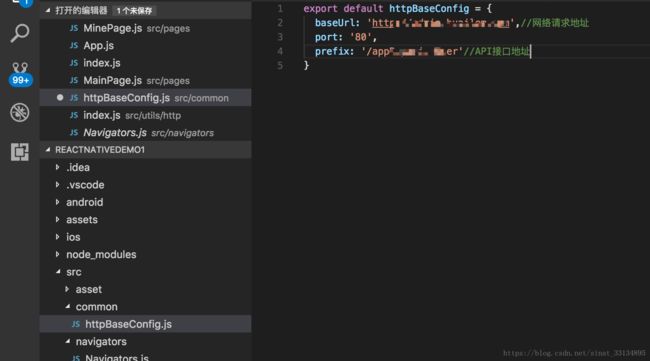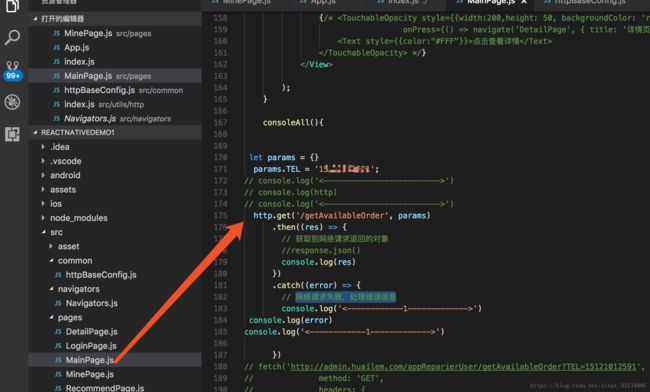- react(基础篇)
盛码笔记
react.jsjavascript前端
React由Meta公司研发,用于构建Web和原生交互界面的库。React官方中文文档查看JSX(一)React组件用户界面的一部分,通俗的来讲,最小的元素组成的单元,可以实现部分逻辑与功能房子的门就可以看成一个组件,由木板和木方组成,有一定功能和作用,多个组件组合就可以形成房子了。组件之间可以相互嵌套,重复使用React组件React中,组件就是一个首字母大写的函数,内部存放组件的逻辑和视图UI
- Taro 网络 API 详解与实用案例
Taro网络API详解与实用案例在现代前端开发中,网络通信是不可或缺的一环。Taro作为一款多端开发框架,提供了丰富且统一的网络API,帮助开发者在小程序、H5、ReactNative等多端环境下高效地进行数据交互。本文将详细介绍Taro的四大网络API:Taro.request、Taro.uploadFile、Taro.downloadFile和Taro.connectSocket,并结合实际案
- echarts 随窗口的移动,改变图表size
StrongerIrene
echartsjavascript前端
错误写法://错误原因:依赖项数组的用法不符合React响应式原理useEffect(()=>{//...},[PieRef,PieRef.current?.clientHeight,PieRef.current?.clientHeight]);关键问题:以上三点得出:这个pieref这样子盯着变动是无效的。正确的写法是,关键点在resizeObserver这里,类似intercetionobse
- forwardRef :打破函数组件封装限制的技巧
在React开发中,我们经常会遇到这样一个需求:如何让父组件直接访问子组件内部的DOM元素或组件实例?例如,点击按钮时自动聚焦某个输入框,或者直接调用子组件的方法。当你面对这样的需求时,你第一时间可能会想到组件通信的方式,通过props传递数据和回调函数,然而,组件通信并不能满足直接访问子组件内部DOM或实例的需求。为了解决这个问题,React提供了React.forwardRef这一特殊机制,本
- react动态增加input框20180828
穆罕周
react
react动态增加input框20180828先在render里写好渲染的方法和点击的方法:二、点击的时候,先获取“记录新建或减少的描述字段的限制个数的数组”和“储存新增描述字段的input框的输入值数组”,若在限制个数之内,则同时给两者增加一个空元素渲染的时候,会根据限制个数的数组长度来return多少个input框,同时,显示的value值也是根据第几个i和储存值的数组的下标来匹配一一对应输入
- 我在纽约的第四天
emma佳小佳
昨儿走了两万多步累到不行一路吃停不下来因为太累放弃牛排馆我就这点出息昂~图片发自App开销1、第七大街pretcafe约30刀图片发自Apppret我真心爱有机轻食咖啡不贵酸奶好吃第一份草我买了两份诺给你看纯素的咖喱味丸子有点像鸡肉丸子柴柴的咖喱味儿做的不错有松子香那个黄色酱我也不知道是啥就觉得好吃不腻图片发自App这个貌美的杯子更像酸奶酪微咸嗯~我想好了今天再去买一只图片发自App2、填坑God
- ReactJS与Node.js:前后端整合之道
背景简介在当前的Web开发领域中,ReactJS作为前端框架的佼佼者,其组件化和声明式的编程方式广受开发者喜爱。而Node.js作为后端技术的热门选择,也因其实时、非阻塞I/O的特性而大放异彩。当ReactJS与Node.js结合时,我们可以构建出全栈的应用程序,实现从前端到后端的无缝对接。本文将从ReactJS与FacebookAPI的集成讲起,逐步过渡到使用Node.js来构建React应用的
- nextjs学习笔记
ainuo5213
web前端框架学习nextreactreact服务端渲染next入门
由于本人最近在学习jocky老师的React16.8+Next.js+Koa2开发Github全栈项目关于react的服务端重构项目,然后跟着老师的视频做笔记,记录下自己的所学知识。目录结构pages(必需):pages目录是nextjs中最终要的一个目录,这个目录的每一个文件都会对应到每一个页面,可以根据地址栏的路由进行跳转。若pages下的js文件在一个目录下,那么nextjs默认会将这个
- next.js刷新页面时二级菜单展开状态判断
啃火龙果的兔子
开发DEMOjavascript前端react.js
在Next.js中保持二级菜单刷新后展开状态的解决方案在Next.js应用中,当页面刷新时保持二级菜单的展开状态,可以通过以下几种方法实现:方法1:使用URL参数保存状态(推荐)import{useRouter}from'next/router';import{useEffect,useState}from'react';constMenuComponent=()=>{constrouter=us
- 用项目说话:我的React博客构建成果与经验复盘
Pan Zonghui
移动端react项目总结react.js前端前端框架
这是一个基于React19+TypeScript+Vite构建的现代化博客系统,采用了最新的前端技术栈和工程化实践。项目不仅实现了完整的博客功能,更在架构设计、性能优化、开发体验等方面体现了企业级应用的标准。成品展示个人博客链接地址:https://pzhdv.cnpc端页面展示首页分类页面关于我文章详情页面移动端技术栈选择与分层设计技术栈选择核心框架与工具React19.1.0:最新版本的Rea
- DHTMLX Suite 9.2 重磅发布:支持历史记录、类Excel交互、剪贴板、拖放增强等多项升级
全球知名的JavaScriptUI组件库DHTMLXSuite迎来9.2新版本!此次更新虽为次版本号,却实质性提升了Grid网格组件的交互能力与用户体验,引入了包括历史记录管理、剪贴板操作、数据选择范围管理、Block区块选择等多项高级模块,支持更接近电子表格的使用体验。新版Grid组件不仅在数据可视化、数据编辑方面功能更强,还增强了与主流前端框架(如React、Vue、Angular)的集成示例
- (2)React的JSX语法
__method__
JSX−JSX是JavaScript语法的扩展。React开发不一定使用JSX,但我们建议使用它。要使用自定义的组件,要以大写字母开始自行编辑一个todolist页面首先在src下面创建src/TodoList.js,输入以下代码importReact,{Component}from"react";classTodoListextendsComponent{render(){return(todo
- 前端实现抛物线小球动画效果:从原理到代码实践
编程随想▿
前端抛物线JSvuereact.js
目录引言一、抛物线动画的核心原理二、纯HTML/CSS实现抛物线动画1.HTML结构2.CSS动画3.效果说明三、动态交互:JavaScript实现抛物线动画1.HTML结构2.JavaScript逻辑3.效果说明四、Vue.js实现抛物线动画1.组件结构2.实现思路五、React实现抛物线动画1.组件代码2.实现思路六、注意事项七、总结引言在前端开发中,动画效果是提升用户体验的重要手段之一。抛物
- Sequential Thinking:AI深度思考的新范式及其与CoT、ReAct的对比分析
码字的字节
人工智能SequentialCoTReAct
引言:AI深度思考的演进与SequentialThinking的崛起在人工智能技术快速发展的今天,AI模型的思考能力正经历着从简单应答到深度推理的革命性转变。这一演进过程不仅反映了技术本身的进步,更体现了人类对机器智能认知边界的持续探索。早期的大语言模型虽然能够生成流畅的文本,但在处理复杂问题时往往表现出"浅思考"的局限性——答案可能看似合理,却缺乏严谨的推理过程和系统性考量。例如,2022年的一
- react/vue vite ts项目中,自动引入路由文件、 import.meta.glob动态引入路由 无需手动引入
初遇你时动了情
react.jsvue.jsjavascript
utils/autoRouteHelper.ts//src/utils/autoRouteHelper.tsimport{lazy}from"react";importwithLoadingfrom"@/components/router/withLoading";/**自动生成某个文件夹下的子路由*/interfaceRouteItem{path:string;element?:any;chil
- 前端框架对比与选择:全面解析前端开发的得力助手
@sinner
技术选型前端前端框架
一、引言在当今快速发展的互联网时代,前端开发扮演着至关重要的角色。前端框架的出现极大地提高了开发效率、提升了用户体验。然而,市场上存在着众多的前端框架,如React、Vue、Angular等,对于开发者来说,如何在这些框架中做出合适的选择成为了一个关键问题。本文将对一些主流的前端框架进行深入对比,分析它们的特点、优势、劣势以及适用场景,希望能为广大开发者在前端框架的选择上提供有益的参考。二、Rea
- 2025年面试官常用的前端开发笔试考题
豆豆(前端开发+ui设计)
vue.jsjavascript前端面试职场和发展
填空题(20道)ReactHooks中,用于模拟类组件生命周期componentDidMount的Hook是________。useEffect在Vue3中,使用________API可以替代Vue2中的data和methods。CompositionWebpack的________插件可以帮助将CSS提取到单独的文件中。MiniCssExtractPlugin在JavaScript中,Promi
- 前端开发好用的AI工具介绍
爱分享的程序员
人工智能AI相关人工智能
以下是前端开发中提升效率的AI工具推荐,涵盖代码生成、UI设计、调试优化等场景:一、代码生成与辅助工具工具名称特点适用场景GitHubCopilot基于OpenAI,智能代码补全(支持JS/TS/React/Vue)快速生成代码片段、函数逻辑Codeium免费开源,多语言支持,IDE插件丰富(VSCode/WebStorm)代码补全、注释生成AmazonCodeWhispererAWS生态集成,支
- React 英语打地鼠游戏——一个寓教于乐的英语学习游戏
伍哥的传说
前端源码分享react.js游戏学习
英语打地鼠游戏一个寓教于乐的英语学习游戏,通过经典的打地鼠玩法帮助用户学习英语单词。✨项目特色游戏化学习经典打地鼠玩法:6个洞穴,听英文选单词即时反馈:答对/答错立即语音提示计分系统:每答对一题得10分,激发学习动力60秒限时:紧张刺激的游戏节奏多媒体体验双语语音播报:英文单词标准发音+中文反馈流畅动画效果:基于Anime.js的精美动画响应式设计:支持手机、平板、电脑多端适配丰富词库多主题分类:
- React Native 自动化测试终极指南:从零开始到持续集成
老猿阿浪
测试reactnativereact.js集成测试单元测试测试工具
写在前面:为什么你的ReactNative应用需要自动化测试?想象一下:你刚发布了一个新版本,用户反馈登录页面崩溃了。你紧急修复,重新打包,AppStore审核等了3天,终于上线——结果另一个隐藏Bug又炸了……如果能提前发现这些问题呢?自动化测试就是你的“代码保镖”,它能在你提交代码时自动检查逻辑错误、UI错位、性能问题,甚至模拟用户操作,确保每次改动不会破坏已有功能。本篇将带你从单元测试到E2
- 从零开始学习 Redux:React Native 项目中的状态管理
wayne214
reactnative学习react.js
Redux是一个用于JavaScript应用程序的状态管理库,通常与React或ReactNative配合使用,帮助管理应用的状态和数据流。其核心原理是通过集中式的“单一数据源”来管理应用状态,避免组件之间的“层层传递”状态和副作用。Redux的原理单一数据源(Store)Redux维护一个全局状态树(即Store),所有组件都通过读取这个状态树来获取数据。应用中的所有状态(数据)都存储在这个单一
- 【vue-7】Vue3 响应式数据声明:深入理解 reactive()
AllenBright
#Vuevue.js前端javascript
在Vue3中,响应式系统经过了彻底的重构,提供了更强大、更灵活的方式来声明和管理响应式数据。reactive()是Vue3组合式API中最核心的响应式函数之一。本文将深入探讨reactive()的工作原理、使用场景以及最佳实践。1.什么是reactive()?reactive()是Vue3提供的一个函数,它接收一个普通JavaScript对象,并返回该对象的响应式代理。这个代理对象与原始对象看起来
- 备份11111
Ellie艾藜
前端
hospital:医疗小项目后台管理,React+axios+antdhttps://gitee.com/whiteshader/ruoyi-react/tree/spring-cloud-v3/#%E6%BC%94%E7%A4%BA%E5%9B%BE
- 前端转后端学习路线整理
一、背景本人是一名Web前端开发,技术栈是Vue和React,不会Node。之前学过,但是因为一些原因(比如没有使用场景,很多概念无法理解,学完就忘等)一直也没有掌握。因为在CMS部门耳濡目染时间久了,感觉不学点后端有点说不过去,而且学起来之后发现也挺有兴趣的。但是对于一名前端开发(而且在学校的时候基本没学习)来说要学习的内容实在太多了,开始的困难在于理清各种技术都是干什么的以及它们之间的关系。现
- 响应式编程入门教程第五节:Unity 生命周期与资源管理中的响应式编程
吉良吉影NeKoSuKi
unity游戏引擎c#开发语言架构
响应式编程入门教程第一节:揭秘UniRx核心-ReactiveProperty-让你的数据动起来!响应式编程入门教程第二节:构建ObservableProperty<T>—封装ReactiveProperty的高级用法响应式编程入门教程第三节:ReactiveCommand与UI交互响应式编程入门教程第四节:响应式集合与数据绑定响应式编程入门教程第五节:Unity生命周期与资源管理中的响应式编程在
- 响应式编程入门教程第一节:揭秘 UniRx 核心 - ReactiveProperty - 让你的数据动起来!
吉良吉影NeKoSuKi
开发语言unityc#游戏引擎
响应式编程入门教程第一节:揭秘UniRx核心-ReactiveProperty-让你的数据动起来!-CSDN博客响应式编程入门教程第二节:构建ObservableProperty<T>—封装ReactiveProperty的高级用法-CSDN博客响应式编程入门教程第三节:ReactiveCommand与UI交互响应式编程入门教程第四节:响应式集合与数据绑定响应式编程入门教程第五节:Unity生命周
- 响应式编程入门教程第三节:ReactiveCommand 与 UI 交互
吉良吉影NeKoSuKi
ui交互unity游戏引擎架构c#开发语言
响应式编程入门教程第一节:揭秘UniRx核心-ReactiveProperty-让你的数据动起来!响应式编程入门教程第二节:构建ObservableProperty<T>—封装ReactiveProperty的高级用法响应式编程入门教程第三节:ReactiveCommand与UI交互响应式编程入门教程第四节:响应式集合与数据绑定响应式编程入门教程第五节:Unity生命周期与资源管理中的响应式编程在
- CSS面试题及详细答案140道之(101-120)
还是大剑师兰特
前后端面试题css大剑师CSS面试题
《前后端面试题》专栏集合了前后端各个知识模块的面试题,包括html,javascript,css,vue,react,java,Openlayers,leaflet,cesium,mapboxGL,threejs,nodejs,mangoDB,MySQL,Linux…。前后端面试题-专栏总目录文章目录一、本文面试题目录101.解释`text-indent`属性的作用。102.如何在CSS中实现响应
- vue2 面试题及详细答案150道(121 - 130)
《前后端面试题》专栏集合了前后端各个知识模块的面试题,包括html,javascript,css,vue,react,java,Openlayers,leaflet,cesium,mapboxGL,threejs,nodejs,mangoDB,MySQL,Linux…。前后端面试题-专栏总目录文章目录一、本文面试题目录121.Vue2中如何实现组件的动态样式绑定?122.Vue2中如何处理跨域请求
- ReactiveCocoa 学习笔记七(RACCommand)
那夜的星空分外清澈
ReactiveCocoaReactiveCocoa
RACCommandRACCommand关键的两个方法如下,理解了他们便能理解RACCommand的作用。-(instancetype)initWithEnabled:(nullableRACSignal*)enabledSignalsignalBlock:(RACSignal*(^)(InputType_Nullableinput))signalBlock;-(RACSignal*)execut
- iOS http封装
374016526
ios服务器交互http网络请求
程序开发避免不了与服务器的交互,这里打包了一个自己写的http交互库。希望可以帮到大家。
内置一个basehttp,当我们创建自己的service可以继承实现。
KuroAppBaseHttp *baseHttp = [[KuroAppBaseHttp alloc] init];
[baseHttp setDelegate:self];
[baseHttp
- lolcat :一个在 Linux 终端中输出彩虹特效的命令行工具
brotherlamp
linuxlinux教程linux视频linux自学linux资料
那些相信 Linux 命令行是单调无聊且没有任何乐趣的人们,你们错了,这里有一些有关 Linux 的文章,它们展示着 Linux 是如何的有趣和“淘气” 。
在本文中,我将讨论一个名为“lolcat”的小工具 – 它可以在终端中生成彩虹般的颜色。
何为 lolcat ?
Lolcat 是一个针对 Linux,BSD 和 OSX 平台的工具,它类似于 cat 命令,并为 cat
- MongoDB索引管理(1)——[九]
eksliang
mongodbMongoDB管理索引
转载请出自出处:http://eksliang.iteye.com/blog/2178427 一、概述
数据库的索引与书籍的索引类似,有了索引就不需要翻转整本书。数据库的索引跟这个原理一样,首先在索引中找,在索引中找到条目以后,就可以直接跳转到目标文档的位置,从而使查询速度提高几个数据量级。
不使用索引的查询称
- Informatica参数及变量
18289753290
Informatica参数变量
下面是本人通俗的理解,如有不对之处,希望指正 info参数的设置:在info中用到的参数都在server的专门的配置文件中(最好以parma)结尾 下面的GLOBAl就是全局的,$开头的是系统级变量,$$开头的变量是自定义变量。如果是在session中或者mapping中用到的变量就是局部变量,那就把global换成对应的session或者mapping名字。
[GLOBAL] $Par
- python 解析unicode字符串为utf8编码字符串
酷的飞上天空
unicode
php返回的json字符串如果包含中文,则会被转换成\uxx格式的unicode编码字符串返回。
在浏览器中能正常识别这种编码,但是后台程序却不能识别,直接输出显示的是\uxx的字符,并未进行转码。
转换方式如下
>>> import json
>>> q = '{"text":"\u4
- Hibernate的总结
永夜-极光
Hibernate
1.hibernate的作用,简化对数据库的编码,使开发人员不必再与复杂的sql语句打交道
做项目大部分都需要用JAVA来链接数据库,比如你要做一个会员注册的 页面,那么 获取到用户填写的 基本信后,你要把这些基本信息存入数据库对应的表中,不用hibernate还有mybatis之类的框架,都不用的话就得用JDBC,也就是JAVA自己的,用这个东西你要写很多的代码,比如保存注册信
- SyntaxError: Non-UTF-8 code starting with '\xc4'
随便小屋
python
刚开始看一下Python语言,传说听强大的,但我感觉还是没Java强吧!
写Hello World的时候就遇到一个问题,在Eclipse中写的,代码如下
'''
Created on 2014年10月27日
@author: Logic
'''
print("Hello World!");
运行结果
SyntaxError: Non-UTF-8
- 学会敬酒礼仪 不做酒席菜鸟
aijuans
菜鸟
俗话说,酒是越喝越厚,但在酒桌上也有很多学问讲究,以下总结了一些酒桌上的你不得不注意的小细节。
细节一:领导相互喝完才轮到自己敬酒。敬酒一定要站起来,双手举杯。
细节二:可以多人敬一人,决不可一人敬多人,除非你是领导。
细节三:自己敬别人,如果不碰杯,自己喝多少可视乎情况而定,比如对方酒量,对方喝酒态度,切不可比对方喝得少,要知道是自己敬人。
细节四:自己敬别人,如果碰杯,一
- 《创新者的基因》读书笔记
aoyouzi
读书笔记《创新者的基因》
创新者的基因
创新者的“基因”,即最具创意的企业家具备的五种“发现技能”:联想,观察,实验,发问,建立人脉。
第一部分破坏性创新,从你开始
第一章破坏性创新者的基因
如何获得启示:
发现以下的因素起到了催化剂的作用:(1) -个挑战现状的问题;(2)对某项技术、某个公司或顾客的观察;(3) -次尝试新鲜事物的经验或实验;(4)与某人进行了一次交谈,为他点醒
- 表单验证技术
百合不是茶
JavaScriptDOM对象String对象事件
js最主要的功能就是验证表单,下面是我对表单验证的一些理解,贴出来与大家交流交流 ,数显我们要知道表单验证需要的技术点, String对象,事件,函数
一:String对象;通常是对字符串的操作;
1,String的属性;
字符串.length;表示该字符串的长度;
var str= "java"
- web.xml配置详解之context-param
bijian1013
javaservletweb.xmlcontext-param
一.格式定义:
<context-param>
<param-name>contextConfigLocation</param-name>
<param-value>contextConfigLocationValue></param-value>
</context-param>
作用:该元
- Web系统常见编码漏洞(开发工程师知晓)
Bill_chen
sqlPHPWebfckeditor脚本
1.头号大敌:SQL Injection
原因:程序中对用户输入检查不严格,用户可以提交一段数据库查询代码,根据程序返回的结果,
获得某些他想得知的数据,这就是所谓的SQL Injection,即SQL注入。
本质:
对于输入检查不充分,导致SQL语句将用户提交的非法数据当作语句的一部分来执行。
示例:
String query = "SELECT id FROM users
- 【MongoDB学习笔记六】MongoDB修改器
bit1129
mongodb
本文首先介绍下MongoDB的基本的增删改查操作,然后,详细介绍MongoDB提供的修改器,以完成各种各样的文档更新操作 MongoDB的主要操作
show dbs 显示当前用户能看到哪些数据库
use foobar 将数据库切换到foobar
show collections 显示当前数据库有哪些集合
db.people.update,update不带参数,可
- 提高职业素养,做好人生规划
白糖_
人生
培训讲师是成都著名的企业培训讲师,他在讲课中提出的一些观点很新颖,在此我收录了一些分享一下。注:讲师的观点不代表本人的观点,这些东西大家自己揣摩。
1、什么是职业规划:职业规划并不完全代表你到什么阶段要当什么官要拿多少钱,这些都只是梦想。职业规划是清楚的认识自己现在缺什么,这个阶段该学习什么,下个阶段缺什么,又应该怎么去规划学习,这样才算是规划。
- 国外的网站你都到哪边看?
bozch
技术网站国外
学习软件开发技术,如果没有什么英文基础,最好还是看国内的一些技术网站,例如:开源OSchina,csdn,iteye,51cto等等。
个人感觉如果英语基础能力不错的话,可以浏览国外的网站来进行软件技术基础的学习,例如java开发中常用的到的网站有apache.org 里面有apache的很多Projects,springframework.org是spring相关的项目网站,还有几个感觉不错的
- 编程之美-光影切割问题
bylijinnan
编程之美
package a;
public class DisorderCount {
/**《编程之美》“光影切割问题”
* 主要是两个问题:
* 1.数学公式(设定没有三条以上的直线交于同一点):
* 两条直线最多一个交点,将平面分成了4个区域;
* 三条直线最多三个交点,将平面分成了7个区域;
* 可以推出:N条直线 M个交点,区域数为N+M+1。
- 关于Web跨站执行脚本概念
chenbowen00
Web安全跨站执行脚本
跨站脚本攻击(XSS)是web应用程序中最危险和最常见的安全漏洞之一。安全研究人员发现这个漏洞在最受欢迎的网站,包括谷歌、Facebook、亚马逊、PayPal,和许多其他网站。如果你看看bug赏金计划,大多数报告的问题属于 XSS。为了防止跨站脚本攻击,浏览器也有自己的过滤器,但安全研究人员总是想方设法绕过这些过滤器。这个漏洞是通常用于执行cookie窃取、恶意软件传播,会话劫持,恶意重定向。在
- [开源项目与投资]投资开源项目之前需要统计该项目已有的用户数
comsci
开源项目
现在国内和国外,特别是美国那边,突然出现很多开源项目,但是这些项目的用户有多少,有多少忠诚的粉丝,对于投资者来讲,完全是一个未知数,那么要投资开源项目,我们投资者必须准确无误的知道该项目的全部情况,包括项目发起人的情况,项目的维持时间..项目的技术水平,项目的参与者的势力,项目投入产出的效益.....
- oracle alert log file(告警日志文件)
daizj
oracle告警日志文件alert log file
The alert log is a chronological log of messages and errors, and includes the following items:
All internal errors (ORA-00600), block corruption errors (ORA-01578), and deadlock errors (ORA-00060)
- 关于 CAS SSO 文章声明
denger
SSO
由于几年前写了几篇 CAS 系列的文章,之后陆续有人参照文章去实现,可都遇到了各种问题,同时经常或多或少的收到不少人的求助。现在这时特此说明几点:
1. 那些文章发表于好几年前了,CAS 已经更新几个很多版本了,由于近年已经没有做该领域方面的事情,所有文章也没有持续更新。
2. 文章只是提供思路,尽管 CAS 版本已经发生变化,但原理和流程仍然一致。最重要的是明白原理,然后
- 初二上学期难记单词
dcj3sjt126com
englishword
lesson 课
traffic 交通
matter 要紧;事物
happy 快乐的,幸福的
second 第二的
idea 主意;想法;意见
mean 意味着
important 重要的,重大的
never 从来,决不
afraid 害怕 的
fifth 第五的
hometown 故乡,家乡
discuss 讨论;议论
east 东方的
agree 同意;赞成
bo
- uicollectionview 纯代码布局, 添加头部视图
dcj3sjt126com
Collection
#import <UIKit/UIKit.h>
@interface myHeadView : UICollectionReusableView
{
UILabel *TitleLable;
}
-(void)setTextTitle;
@end
#import "myHeadView.h"
@implementation m
- N 位随机数字串的 JAVA 生成实现
FX夜归人
javaMath随机数Random
/**
* 功能描述 随机数工具类<br />
* @author FengXueYeGuiRen
* 创建时间 2014-7-25<br />
*/
public class RandomUtil {
// 随机数生成器
private static java.util.Random random = new java.util.R
- Ehcache(09)——缓存Web页面
234390216
ehcache页面缓存
页面缓存
目录
1 SimplePageCachingFilter
1.1 calculateKey
1.2 可配置的初始化参数
1.2.1 cach
- spring中少用的注解@primary解析
jackyrong
primary
这次看下spring中少见的注解@primary注解,例子
@Component
public class MetalSinger implements Singer{
@Override
public String sing(String lyrics) {
return "I am singing with DIO voice
- Java几款性能分析工具的对比
lbwahoo
java
Java几款性能分析工具的对比
摘自:http://my.oschina.net/liux/blog/51800
在给客户的应用程序维护的过程中,我注意到在高负载下的一些性能问题。理论上,增加对应用程序的负载会使性能等比率的下降。然而,我认为性能下降的比率远远高于负载的增加。我也发现,性能可以通过改变应用程序的逻辑来提升,甚至达到极限。为了更详细的了解这一点,我们需要做一些性能
- JVM参数配置大全
nickys
jvm应用服务器
JVM参数配置大全
/usr/local/jdk/bin/java -Dresin.home=/usr/local/resin -server -Xms1800M -Xmx1800M -Xmn300M -Xss512K -XX:PermSize=300M -XX:MaxPermSize=300M -XX:SurvivorRatio=8 -XX:MaxTenuringThreshold=5 -
- 搭建 CentOS 6 服务器(14) - squid、Varnish
rensanning
varnish
(一)squid
安装
# yum install httpd-tools -y
# htpasswd -c -b /etc/squid/passwords squiduser 123456
# yum install squid -y
设置
# cp /etc/squid/squid.conf /etc/squid/squid.conf.bak
# vi /etc/
- Spring缓存注解@Cache使用
tom_seed
spring
参考资料
http://www.ibm.com/developerworks/cn/opensource/os-cn-spring-cache/
http://swiftlet.net/archives/774
缓存注解有以下三个:
@Cacheable @CacheEvict @CachePut
- dom4j解析XML时出现"java.lang.noclassdeffounderror: org/jaxen/jaxenexception"错误
xp9802
java.lang.NoClassDefFoundError: org/jaxen/JaxenExc
关键字: java.lang.noclassdeffounderror: org/jaxen/jaxenexception
使用dom4j解析XML时,要快速获取某个节点的数据,使用XPath是个不错的方法,dom4j的快速手册里也建议使用这种方式
执行时却抛出以下异常:
Exceptio

